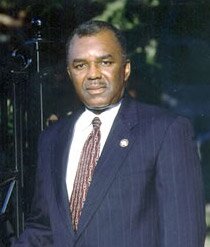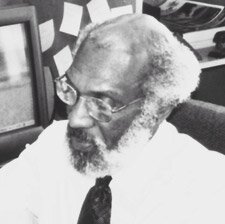 |
 |
 |
|
|
|||||||||||||||
|
|
|||||||||||||||
| Email Article | Printable Page |
Benedict Grading Policy Prompts Controversy
 |
|
Photo credit: Benedict College
President David Swinton says, "Some students are not revealed of their true knowledge" by standardized tests.
|
The firings of two Benedict College professors in the spring over their refusal to implement a controversial grading policy has sparked a barrage of criticism -- both local and national -- that the college is lowering academic standards.
The professors, Milwood Motley and Larry Williams, received letters of termination in the mail in June. They were fired for insubordination, Benedict College's president, David H. Swinton, said in an interview.
Speaking to local news media after word of the firings was made public, Motley said, �They told us to go back and recalculate the grades. I just refused to do it.�
Benedict�s Success Equals Effort (SEE) grading policy, in place since fall 2003, says that freshmen will be guaranteed a passing grade if they put forth a specified level of effort. Swinton said that means taking all tests, promptly turning in all assignments, participating in class discussion, doing all that is asked by the instructors and attending classes regularly.
Freshmen are graded on a scale of 60 percent effort and 40 percent acquired knowledge. For sophomores, the grading policy originally was set at 50 percent effort, 50 percent acquired knowledge, but since the controversy began, that has been adjusted: Now, sophomores must demonstrate 40 percent effort and 60 percent acquired knowledge.
The policy does not apply to junior- and senior-level courses.
 |
|
Photo credit: Tiger News
William Gunn, of Benedict's chapter of the American Association of University Professors, says that he understands what the president is trying to do, but, "I do not believe in the policy nor the way it was implemented."
|
After the firing of Motley and Williams, a faculty grievance committee voted for the reinstatement of at least one of the professors. However, the appeal was rejected by Swinton, who ultimately determines who is hired and fired; he refused to rehire the two. Motley and Williams have since filed lawsuits against the college. Motley�s wife, Wanda, is also a party in his suit. She cites marital and financial stress on her family.
Williams, a Benedict alumnus who has a doctorate in environmental sciences, said in an interview, �I do not believe the policy serves the students, nor does the school any service. When I was in school here, the academics were much more rigorous. I have mixed emotions. I really want what is best. HBCUs have always been looked at negatively. This does nothing but add to those stereotypes.�
Motley, who has a doctorate in microbiology, said, �I think the intention of the policy is good, but as an educator I could not do it. . . . I felt that it lowered my professional standards. In good conscience, I could not do something that I felt was wrong.�
Williams is now an adjunct professor at South Carolina State University in Orangeburg. Motley is teaching part-time at Midlands Technical College, airport campus, in Columbia, S. C.
Meanwhile, the debate over the merits of SEE continues.
Criticism of the policy, the firings and even the academic standards of the college has come from some faculty and students, and from columnists in local and national news media.
Swinton defends the policy and its intent. He has been holding special meetings to hear comments and to listen to concerns over the perception of the college. He has also sent letters to parents.
During the interview, Swinton noted that the policy is perhaps a new type of grading assessment, but one he said he felt was needed to find solutions to many of the problems faced by African American youth in schools.
�In South Carolina as in the nation, African Americans are disadvantaged socially and economically,� he said. �Some students are not revealed of their true knowledge by tests such as PACT exams when they leave from the public school systems.� PACT refers to the Palmetto Achievement Challenge Tests, part of South Carolina's statewide assessment program measuring student performance on state standards.
Having been an educator for more than 30 years and a college president for more than 10, Swinton said, he has seen enough to know that the SEE policy can work.
�It is something new, but it is designed to help give students that extra push, to give them the necessary tools to be successful later in life,� he said. Swinton also said he believes the policy will help with retention.
�If students are taught how to be successful students, then they more than likely will stay in school until they graduate,� he said.
Asked if there were any assessment tools in place to evaluate the policy, Swinton said the college was looking at several measures, but that overall he felt confident the policy will meet its goals: to achieve higher test scores, improve academic performance and dramatically improve retention and graduation rates.
As to whether the controversial policy might affect Benedict�s accreditation with the Southern Association of Colleges and Schools, Swinton said, �The college will be in full compliance if there is something SACS feels we need to change.�
However, having served as chair of several accreditation committees, Swinton said he knows the accreditation process: �I know what has to be done.�
Asked about criticism from several faculty members, Swinton said the policy is �designed to improve or empower the faculty to teach more effectively.�
However, Benedict's chapter of the American Association of University Professors has grave concerns about the policy, said its head, William Gunn, chairman of the health, physical education and recreation department. Chapter members have issued a position paper explaining why they believe the policy might hurt the institution.
�While I understand what Swinton is trying to do,� said Gunn, �I do not believe in the policy nor the way it was implemented.�
Gunn said some things should have taken place before the policy was implemented, such as faculty discussion over the merits of the policy and faculty involvement in how it would be implemented on a per-instructor basis, to help ensure academic freedom.
�This is not a new practice,� he said. �As stated in the position paper, academic policies have been handed down from above, as opposed to being worked out from the ground up with faculty voices and votes.� Gunn added that in order for the professors to uphold the school�s motto of "being powers for good in society," they are going to need help from the administration.
"I am not a renegade," he said. "I like Swinton. I think he�s a great guy. However, we just see things differently.
"I believe from the bottom of my soul that students can do anything they want to do, once they believe in themselves. I think the policy shortchanges them. Motivation comes from within,� he said.
Swinton said he is tired of the negative publicity.
�This is another form of racism,� he said. At the end of the assessment of the policy, which should be in four years, when the first students under SEE graduate, �I wonder how they will react when the results come back positive.�
Posted Nov. 3, 2004
In News
Hip-Hop Generation Debated at "State of Black Union" Conference
Student Journalists Gear Up for HBCU Newspaper Conference
| Home | News | Sports | Culture | Voices | Images | Projects | About Us Copyright © 2007 Black College Wire. Black College Wire is a project of the Black College Communication Association and has partnerships with The National Association of Black Journalists and the Robert C. Maynard Institute for Journalism Education. |